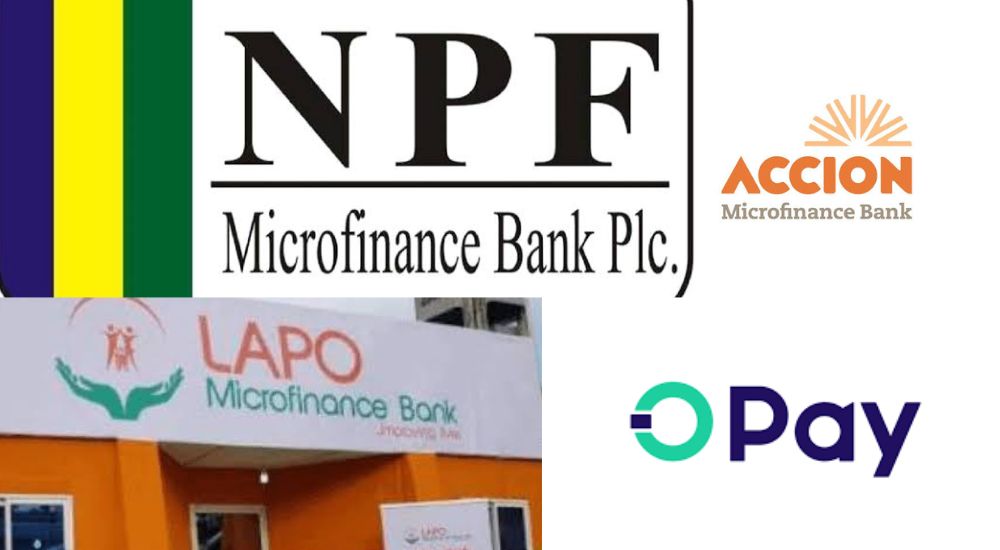Top 10 Microfinance Banks in Nigeria
Microfinance banks have a crucial function in increasing financial inclusion and empowering those with low incomes in Nigeria. The leading microfinance banks are promoting financial inclusion via the implementation of new services such as expedited loans, digital banking, and customer-focused solutions. This study examines the top microfinance banks in Nigeria.
An analysis of Microfinance Banks in Nigeria
Microfinance banks (MFBs) are dedicated financial organisations that accept deposits and provide financial services to the unbanked and underserved people of Nigeria. Unlike commercial banks, which focus on corporate customers and high-net-worth people, microfinance banks (MFBs) serve low-income families, microentrepreneurs, smallholder farmers, and other disadvantaged groups.
Given that more than 40 million Nigerians do not have access to official financial services, microfinance banks (MFBs) play a crucial role in making money accessible to everyone. By providing microcredit, savings, insurance, and several other services, they enable Nigerians to manage their expenses, reduce risks, establish enterprises, and allocate funds towards activities that generate revenue.
Microfinance banks often have higher interest rates compared to commercial banks, but they provide more lenient collateral requirements and a more efficient loan processing system. This enables microenterprises and low-income people, who are often marginalized by conventional banks, to have easier access to financial services. In the end, microfinance banks (MFBs) may stimulate widespread economic development by promoting entrepreneurship and facilitating access to money.
The Top 10 Microfinance Banks in Nigeria
Given the large number of microfinance banks in Nigeria, selecting the appropriate provider might be a daunting task. These are the top 10 MFBs that are at the forefront of increasing financial inclusion with their creative approaches:
LAPO Microfinance Bank
With a client base of over 6 million and a network of 340 offices throughout Nigeria, this microfinance bank holds the title of being the biggest in the country. LAPO offers specialised financial services, such as microloans, savings accounts, microinsurance, and other personalised services, designed specifically for microentrepreneurs and low-income families. What distinguishes them is their commitment to a social purpose and their emphasis on impact investment.
● Total assets: NGN 353 billion, which is approximately equivalent to $700 million USD.
● Impact: Facilitated the establishment of more than 1 million new enterprises via microcredit initiatives.
ACCION Microfinance Bank
Initially established as a microfinance non-governmental organisation (NGO), ACCION acquired a nationwide banking licence in 2020. Their mobile application-based banking and digital lending platforms are broadening financial accessibility.
● History: ACCION Microfinance Nigeria was established in 2007.
● Digital Innovation: The microfinance bank is offering the first comprehensive digital banking platform.
AB Microfinance Bank
One of the rapidly expanding microfinance banks (MFBs) in Nigeria boasts a network of more than 200 locations spanning across all 36 states. Provides expedited financing options for both corporate and individual needs, in addition to offering microinsurance, savings accounts, and many supplementary services.
● Founded in 2008
Customer base: Over 1 million people across the nation have used our services.
Assets Microfinance Bank
Our company offers microloans, savings accounts, and other financial services specifically designed for retail clients and micro, small, and medium enterprises (MSMEs). Assets: MFB distinguishes itself with its exceptional customer service and tailored product offerings.
● Available options: versatile lending products such as salary advances and specialised programmes for female entrepreneurs.
The name of the bank is CIT Microfinance Bank.
This financial institution offers personal loans, business loans, and access to savings and investment portfolios at low interest rates in order to empower small and medium company owners. CIT also provides school loans, asset loans, rent loans, and other customised services.
● Targeted Industries: Micro, Small, and Medium Enterprises (MSMEs), individuals engaged in entrepreneurial activities, and those receiving a salary
● Loan Categories: Business loans, asset finance, employee loans, school tuition funding
KUDA Microfinance Bank
An exclusively digital bank without any physical branch locations. Kuda offers mobile banking services and expedited, collateral-free loans to a client base exceeding 1 million.
● Total assets: NGN 4 billion, equivalent to around $8 million USD.
● Services: The banking app provides immediate paycheck advances, free money transfers, automatic savings, and personal and commercial loans.
Mutual Benefits Microfinance Bank
Reciprocal advantages Microfinance Bank is a digital financial institution that provides banking services without charging any fees, gives customised account numbers, and enables immediate transaction settlements. In addition, you have the opportunity to generate income via referrals, establishing communities, and offering financial services. Reciprocal advantages The Microfinance Bank also facilitates various payment methods and enables QR code payments.
Reciprocal advantages The Microfinance Bank provides a range of credit options, including personal loans, business loans, and access to savings and investment portfolios, all at low interest rates. In addition, it provides school loans, asset loans, rent loans, and other types of loans. The loan amount and payback time are contingent upon the loan type and the borrower's ability to repay.
Reciprocal advantages Microfinance Bank caters to several sectors, including people, organisations, small and medium companies (SMEs), and low-income earners. The company's objective is to enable its clients by offering financial services in a sustainable, ethical, and lucrative way.
BoI Microfinance Bank
This is a subsidiary of the Bank of Industry that specialises in offering microloans and capacity development services to microenterprises and cooperatives. BoI MFB provides savings accounts, microinsurance, and agent banking services for further convenience.
● Ownership: Bank of Industry is the only owner.
● Initiatives: focused financial assistance and educational programmes for young and female business owners.
VFD Microfinance Bank, often known as VBank
VFD Group Plc's subsidiary offers digital banking services, rapid loans, investment opportunities, and microinsurance. VBank prioritises user-friendly mobile banking services.
● Parent firm: VFD Group is a prominent Nigerian financial technology firm.
● Digital Offerings: The provision of services such as creating accounts, lending money, and transferring funds in a digital format.
Emerging Developments in Microfinance in Nigeria
Several prominent MFBs are using technology to promote financial inclusion by implementing digital banking solutions. For example, ACCION and Kuda provide comprehensive mobile applications for effortless banking. VFD Microfinance and other companies are using digital technologies to enhance the customer experience by automating important procedures. Other growing developments include the use of biometric identification verification and the increased utilisation of mobile money. In the end, these initiatives to convert information into digital form are increasing availability and providing improved services to those who have limited access to traditional banking services.
LAPO Microfinance Bank has implemented solar-powered mobile branches to extend its services to remote regions that have inadequate infrastructure. Assets: Microfinance Bank utilises data analytics to tailor its services and connect consumers with the most suitable products. Technology and a focus on meeting customer needs will shape the direction of microfinance in the future.
Microfinance Services and Offerings
Microfinance banks provide a variety of products specifically designed for the financial requirements of people with low incomes and small businesses. The following items are included:
- Microcredit: small, short-term loans supporting business activities and consumption smoothing.
- Savings: Basic deposit accounts are used to safely accumulate funds and earn interest.
- Microinsurance: protection against risks like death, medical emergencies, or property damage.
- Money transfers: Enables direct payments and cash transfers for unbanked customers.
Additionally, some MFBs provide specialised offerings like solar loans for the purpose of adopting renewable energy, school loans to cover educational fees, and agricultural finance. Mutual Trust also offers financial support for buying smartphones, acknowledging their ability to enhance economic empowerment by providing digital access.
Microfinance banks provide increased financial access and social mobility by customising their offers to cater to the requirements of the poor.
Choosing the Right Microfinance Bank
When choosing a microfinance bank, it is crucial to carefully analyse many factors in order to choose the most suitable alternative for your specific requirements. These factors include:
- Interest Rates: Compare rates across banks to find the most competitive pricing.
- Proximity: Opt for a bank with branches or a mobile presence near where you live and work.
- Offerings: Assess which bank provides the services and loan products you require.
- Reviews: Read customer feedback to evaluate the quality of service.
- Digital Convenience: If you prefer digital banking, choose a provider with a robust online/mobile platform.
To choose the most suitable microfinance bank for your financial needs, you may assess many aspects, such as cost, location, product offerings, and reputation. Feel free to inquire and seek clarification prior to making a commitment.
The Future of Microfinance in Nigeria
In the future, microfinance institutions in Nigeria will persist in promoting financial inclusion by developing new products and using technology. By implementing advanced mobile banking services, using alternative credit scoring methods, and offering higher customisation, microfinance banks (MFBs) may effectively cater to the needs of the underbanked population.
Nevertheless, in order for the industry to flourish, more regulatory supervision is necessary to guarantee consumer safeguarding and equitable pricing. The Central Bank of Nigeria also has a responsibility to facilitate the broader implementation of agent banking and mobile money in order to enhance financial inclusivity.
In conclusion, the microfinance institutions mentioned here will play a crucial role in unleashing the economic capabilities of the millions of unbanked individuals in Nigeria. Through the provision of customised financial services, disadvantaged communities may be empowered to stimulate fair and just growth.
Microfinance institutions are increasing the availability of financial services and offering customised banking solutions specifically designed for the population in Nigeria who do not have access to traditional banking services. LAPO, ACCION, and Kuda are prominent financial service providers that use digital innovation and social impact to promote financial inclusion.
Through a comprehensive analysis of Nigeria's microfinance sector and a careful evaluation of available choices, individuals and microenterprises may have access to a range of financial services, such as loans, savings accounts, insurance, and more, in order to fulfil their specific requirements. Although there is still more work to be done, the top 10 microfinance banks discussed in this article are laying the groundwork for a future in which financial services are accessible to everybody.
Frequently Asked Questions
A microfinance bank and a commercial bank in Nigeria vary in many aspects.
Microfinance banks provide financial services to low-income families and microenterprises in Nigeria who do not have access to traditional banking services. They provide reduced loan amounts with less stringent collateral requirements. Microfinance banks provide individualised, community-based financial services, in contrast to the business-oriented approach of commercial banks.
Microfinance banks promote financial inclusion by providing access to financial services to those who are traditionally excluded from the formal banking sector.
Microfinance banks in Nigeria provide regulated financial services to disadvantaged communities by delivering microloans, digital banking, and specialised products such as microinsurance. Their services facilitate entrepreneurship, mitigate income volatility, and empower those who are economically disadvantaged.
Q: Which microfinance bank has the most branches in Nigeria?
LAPO Microfinance Bank has the most extensive network in Nigeria, with over 340 branches spread throughout all 36 states and FCT Abuja. They have exceeded 6 million clients, making them the microfinance provider with the highest number of consumers.
A: Is it possible for microfinance banks to provide current accounts?
Yes, some prominent microfinance banks (MFBs) such as ACCION and Kuda now provide current and savings accounts to users via their digital banking systems. Microfinance banks encounter regulatory limitations concerning foreign currency transfers.
A: Microfinance banks determine the pricing of their loans using a certain methodology.
A: Microfinance banks in Nigeria have different interest rates and costs. Respected suppliers establish a connection between price and the cost of finance and risk in order to ensure long-term viability. Nevertheless, several microfinance banks (MFBs) participate in exploitative lending practices; hence, it is crucial to evaluate and contrast available alternatives.



